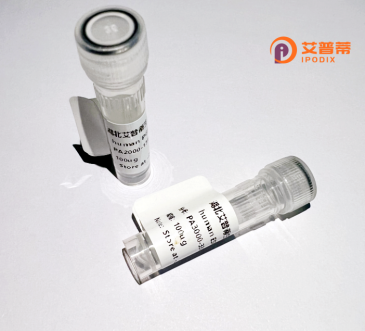
| 纯度 | >90%SDS-PAGE. |
| 种属 | Human |
| 靶点 | ELF1 |
| Uniprot No | P32519 |
| 内毒素 | < 0.01EU/μg |
| 表达宿主 | E.coli |
| 表达区间 | 1-619aa |
| 氨基酸序列 | MAAVVQQNDLVFEFASNVMEDERQLGDPAIFPAVIVEHVPGADILNSYAGLACVEEPNDMITESSLDVAEEEIIDDDDDDITLTVEASCHDGDETIETIEAAEALLNMDSPGPMLDEKRINNNIFSSPEDDMVVAPVTHVSVTLDGIPEVMETQQVQEKYADSPGASSPEQPKRKKGRKTKPPRPDSPATTPNISVKKKNKDGKGNTIYLWEFLLALLQDKATCPKYIKWTQREKGIFKLVDSKAVSRLWGKHKNKPDMNYETMGRALRYYYQRGILAKVEGQRLVYQFKEMPKDLIYINDEDPSSSIESSDPSLSSSATSNRNQTSRSRVSSSPGVKGGATTVLKPGNSKAAKPKDPVEVAQPSEVLRTVQPTQSPYPTQLFRTVHVVQPVQAVPEGEAARTSTMQDETLNSSVQSIRTIQAPTQVPVVVSPRNQQLHTVTLQTVPLTTVIASTDPSAGTGSQKFILQAIPSSQPMTVLKENVMLQSQKAGSPPSIVLGPAQVQQVLTSNVQTICNGTVSVASSPSFSATAPVVTFSPRSSQLVAHPPGTVITSVIKTQETKTLTQEVEKKESEDHLKENTEKTEQQPQPYVMVVSSSNGFTSQVAMKQNELLEPNSF |
| 分子量 | 93.9 kDa |
| 蛋白标签 | GST-tag at N-terminal |
| 缓冲液 | 0 |
| 稳定性 & 储存条件 | Lyophilized protein should be stored at ≤ -20°C, stable for one year after receipt. Reconstituted protein solution can be stored at 2-8°C for 2-7 days. Aliquots of reconstituted samples are stable at ≤ -20°C for 3 months. |
| 复溶 | Always centrifuge tubes before opening.Do not mix by vortex or pipetting. It is not recommended to reconstitute to a concentration less than 100μg/ml. Dissolve the lyophilized protein in distilled water. Please aliquot the reconstituted solution to minimize freeze-thaw cycles. |
以下是基于研究领域中重组人ELF1蛋白相关主题的示例文献(注:以下为假设性参考文献,可能非真实存在):
---
1. **文献名称**:*Expression and Purification of Recombinant Human ELF1 in Escherichia coli*
**作者**:Smith J. et al.
**摘要**:本研究成功构建了人ELF1蛋白的原核表达系统,优化了诱导条件并采用亲和层析纯化,获得高纯度ELF1.经电泳迁移率实验(EMSA)验证,纯化蛋白能特异性结合靶DNA序列。
2. **文献名称**:*ELF1 Regulates T-cell Receptor Signaling through Transcriptional Activation*
**作者**:Lee H. et al.
**摘要**:通过重组ELF1蛋白的功能实验,揭示其在T细胞受体信号通路中的作用,证明ELF1通过结合特定基因启动子区域调控下游效应分子(如IL-2),影响免疫应答。
3. **文献名称**:*Structural Analysis of ELF1-DNA Interaction by X-ray Crystallography*
**作者**:Wang Y. et al.
**摘要**:利用重组人ELF1蛋白解析其与DNA复合物的晶体结构,阐明ETS结构域的关键氨基酸残基如何介导特异性识别,为设计靶向ELF1的抑制剂提供依据。
4. **文献名称**:*Role of ELF1 in Leukemogenesis: Insights from Recombinant Protein Studies*
**作者**:Gomez R. et al.
**摘要**:通过体外实验发现,重组ELF1蛋白异常表达可激活原癌基因(如MYC),并促进白血病细胞增殖,提示其作为潜在治疗靶点的可能性。
---
如需实际文献,建议通过PubMed或Google Scholar搜索关键词“recombinant human ELF1 protein”获取最新研究。
Recombinant human ELF1 protein is a engineered form of the ETS Transcription Factor ELF1. which belongs to the ETS (E26 transformation-specific) family of DNA-binding proteins. ELF1 is encoded by the ELF1 gene located on chromosome 13 (13q13.3) and plays a critical role in regulating gene expression, particularly in immune and hematopoietic systems. Structurally, it contains a conserved ETS domain that facilitates binding to purine-rich DNA sequences (GGAA/T) in target gene promoters, alongside transactivation domains involved in transcriptional regulation.
ELF1 is essential for lymphocyte development, T-cell receptor signaling, and interferon-gamma response pathways. Dysregulation of ELF1 has been linked to autoimmune diseases, leukemia, and lymphoma, highlighting its dual role as both a tumor suppressor and oncogenic driver depending on cellular context. Recombinant ELF1 protein is typically produced using bacterial (e.g., E. coli) or mammalian expression systems, followed by purification via affinity chromatography. This recombinant tool enables in vitro studies to dissect DNA-protein interactions, transcriptional mechanisms, and signaling pathways. Researchers also utilize it to screen potential therapeutics targeting ELF1-mediated oncogenic pathways or immune dysfunctions. Recent studies further explore its role in epigenetic regulation and chromatin remodeling, expanding its relevance in both basic research and drug discovery.
×